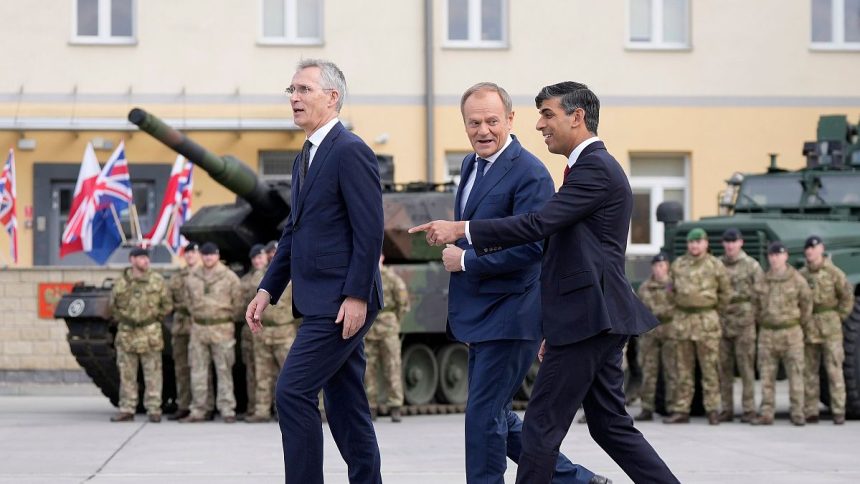UK Prime Minister Rishi Sunak has announced that his government will increase defence spending to 2.5% of GDP by the end of the decade.
Sunak made the announcement during a visit to Warsaw, where he also unveiled a new pledge to send arms to Ukraine.
He said the government is putting the UK’s defence industry “on a war footing”, describing it as the “biggest strengthening of our national defence for a generation”.
“In a world that is the most dangerous it has been since the end of the Cold War, we cannot be complacent,” he said at a news briefing in the Polish capital alongside NATO secretary general Jens Stoltenberg.
“As our adversaries align, we must do more to defend our country, our interests and our values.”
London also pledged an additional €578 million in new military supplies for Ukraine, including long-range missiles and four million rounds of ammunition.
It comes as Kyiv struggles to hold off Russian forces, which the US-based Institute for the Study of War says are planning a major offensive.
On the defence front, the UK has struggled to boost the size of its military forces in recent years.
It also suffered a major embarrassment earlier this year when a test of the missile that carries its submarine-based nuclear deterrent failed almost immediately.
Nonetheless, ministers in the Sunak government have called for ambitious new defence spending and projects, especially since the start of the war in Israel and Gaza.
Penny Mordaunt, a former defence secretary, recently penned a column in which she argued the UK should invest in its own missile defence programme based on Israel’s Iron Dome system.
Cut to the bone
In a time of strained public finances, it is unclear what cuts Sunak’s government and its successors will have to make to find the money needed to fund the increased annual defence spend.
Sunak’s Conservative Party has been consistently well behind the Labour opposition in the polls for nearly two years, as the electorate grow impatient with a cost of living crisis and extreme pressure on public services.
More than a decade of extreme spending cuts combined with an ageing population have put the health service in particular under strain even as growth and productivity remain stagnant.
Despite this trend, the Conservatives are also offering voters relief on national insurance payments in advance of a general election, forcing future governments to spend less on services or raise citizens’ payments back to current levels.
Euronews











